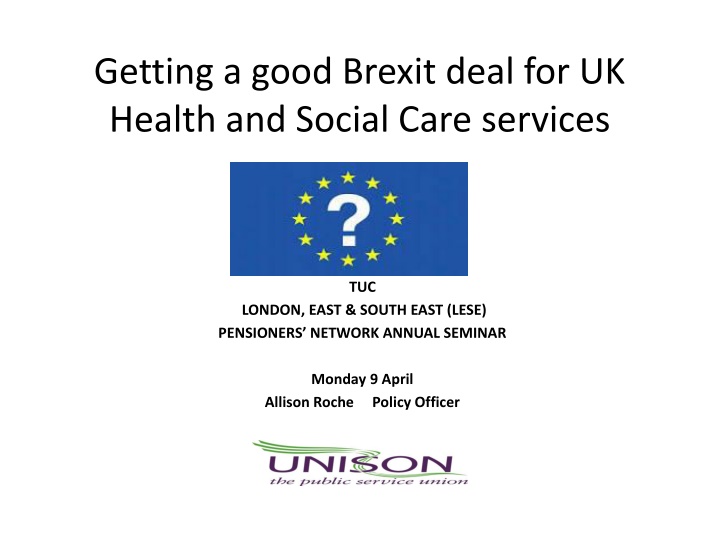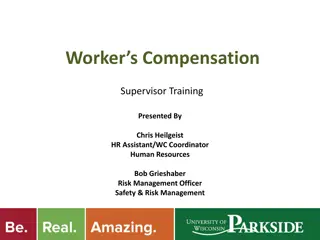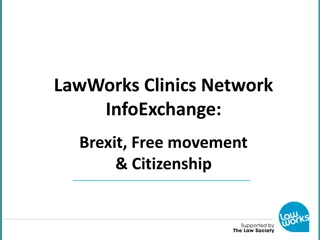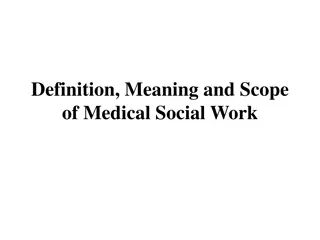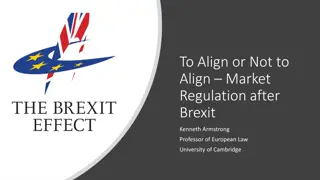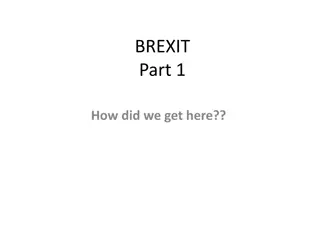Importance of Brexit for UK Health and Social Care Workers
Impact of Brexit on workers' rights in the health and social care sector, including potential challenges and opportunities. Learn about key issues such as employment protections, trade unions, and regulatory changes affecting workers post-Brexit.
Uploaded on Feb 26, 2025 | 1 Views
Download Presentation

Please find below an Image/Link to download the presentation.
The content on the website is provided AS IS for your information and personal use only. It may not be sold, licensed, or shared on other websites without obtaining consent from the author.If you encounter any issues during the download, it is possible that the publisher has removed the file from their server.
You are allowed to download the files provided on this website for personal or commercial use, subject to the condition that they are used lawfully. All files are the property of their respective owners.
The content on the website is provided AS IS for your information and personal use only. It may not be sold, licensed, or shared on other websites without obtaining consent from the author.
E N D
Presentation Transcript
Getting a good Brexit deal for UK Health and Social Care services TUC LONDON, EAST & SOUTH EAST (LESE) PENSIONERS NETWORK ANNUAL SEMINAR Monday 9 April Allison Roche Policy Officer
Exiting the EU Time line Withdrawal Notification Bill (Article 50) - March 2017 EU Withdrawal Bill - June 2018 Phase One negotiations (Divorce Bill, EU Citizens, N. Ireland) completed - draft text December 2017 Phase Two negotiations (Transition, Future Framework EU\UK deal trade and non trade) September 2018 Withdrawal Agreement (WA) EU UK Treaty Autumn 2018 The WA UK & EU Parliament & all 27 MS EU Council Withdrawal and Implementation (WAI) Bill March 2019 Transition period with technical talks on the future EU UK Agreement December 2020 New EU - UK Agreement(s) trade in goods and services, energy, waste, security, defence and research January 2021
Why is Brexit important for health and social care workers ? 4 key issues 1. Workers must not pay for Brexit - Protect Employment and Trade unions workers rights: EU Withdrawal Bill Henry VIII powers could weaken or remove rights after transition Health and Safety, Working Time Rights, Equal Pay, Maternity, Equality Pay, Consultation on collective redundancies, TUPE, Protections for migrant and posted workers
Government use of Statutory Instruments (SIs) to de -regulate rights - 2014 TUPE Regulations Hardy v Meter U case An employer will be unfairly dismissed if the sole or principal reason for his dismissal is a reason connected with the transfer that is not an economic, technical or organisational reason entailing changes in the workforce Case was won on the basis that, a post transfer change of location could not be a valid defence for dismissing a TUPE transferred employee A change of location was not in the definition Economic Technical or Organisational reasons entailing changes in the workforce . Therefore the workers were unfairly dismissed In 2014 TUPE Regulations changed so entailing changes in the workforce now include a change of location
UNISON victory scrapping Employment Tribunal (EAT) Fees 2017 Government introduced EAT fees by an SI and this was also criticised by the Supreme Court (after 3rdcase) Won by EU General Principles & UK Access to Justice The protections offered by EU law, insofar as they were relevant, offered a form of guarantee of rights even in the face of parliamentary sovereignty But that ECJ guarantee of UK aqcuis rights will go along with the supremacy of EU law after 2020 UK domestic constitutional law will now become the focus where we safeguard fundamental rights and rule- of-law values
2. Equality, Citizen and Human Rights Loss of the EU Charter of Fundamental Rights Campaign for non- dilution of existing Equality and Human Rights laws very important for Welfare Reform and Social Care ( e.g. disabled peoples rights, bedroom tax) Rights of EU citizens in the UK and UK citizens in the EU still uncertain (in draft agreement) some rights are only time limited for ECJ protection
3. Promoting the valuable work of EU Citizens in Health & Social Care post Brexit Cavendish Coalition 36 Health and Social care employers and employee organisations campaigning for the vital continued need of EU workers in these public services: UK health and social care workforce 3.4 m health 1.7 million & Social care 1.3m Minimum of 170,000 EU nationals currently working in UK health and social care settings (55,000 in the NHS and 90,000 in social care) There is variation in the proportion of EEA nationals working in different occupations and within different specialism's of a profession. For example, EEA nationals are: 17 % of dentists in the UK 16 %of registered nurses in adult social care in England 10 % of all doctors with variation amongst specialist areas e.g 24% of all Ophthalmologists on specialist register 7 % of social care workers, physiotherapists, care workers and nurses 6 % of midwives 2 % teaching and research staff in nursing and allied health subjects
Cavendish Coalition NHS & Social Care Brexit Key messages 1. Need to carefully manage the ending of FoM for EU workers in health and social care after the transitional arrangements 2. Give unilateral rights now to end uncertainty to EU workers and families (outside WA) 3. Recruit, train and retain the health and social care UK domestic workforce unless more funding then will always need migrant workers 4. Make any new migration system easy for employers and migrants from EU and Non EU 5. Pay up Now - decent pay deal/nurses bursaries
Cavendish Coalition future migration for health and social care workers A fair and just future UK migration system, must as a minimum involve key principles: Easy to understand and navigate - Immigration policy needs to set out with clear and fair rules which prevents exploitation from unscrupulous employers and has enforcement and sanctions Transparent - Immigration policy must be underpinned by clearly understood principles and decision-making must be informed by trusted evidence and open and honest debate Predictable - Immigration process must be predictable and consistent so there is certainty for employers and individuals Accessible - Immigration policy must be simple for individuals to navigate, employers to use and government infrastructure to oversee Affordable - Immigration policy must avoid expensive burdens on employers, individuals and the government
4. Protect public services, standards and labour rights in new trade deals New trade deals - TTIP, CETA, TISA undermine public services, rights and standards through liberalisation and de-regulation Lowering of Food standards, Environment standards, Chemical standards, fuel poverty measures in crease health risks Remove public services from trade deals to stop privatisation and the race to the bottom Remove clauses in trade deals which put investor interests first through legal and court protections against democratic interests Protect public services through maintaining current EU public procurement rules which allow some social provisions Strengthen compliance and sanctions for companies that break employment laws and other regulatory standards
Next steps in Brexit Campaign The Withdrawal Agreement and meaningful vote (Autumn 2018) The future framework EU UK Agreement 5 options: - Remain in the EU - Out the EU in the EEA ( Single Market) - Out the EU and in a Customs Union deal - Out the EU and in a Free Trade deal - No Deal
Next steps in Brexit Campaign TUC and ETUC the deal must have alignment to enable a level playing field or the UK could end up in the global race to the bottom through future introduction of lower standards Could be more than one agreement still have to negotiate access and membership to finance markets with a finance passport, Euratom, Internal energy market, EU Medicines Agency, EU Chemicals Agency, EU Aviation Safety Agency
For more information contact Allison Roche UNISON Policy Officer a.roche@unison.co.uk
